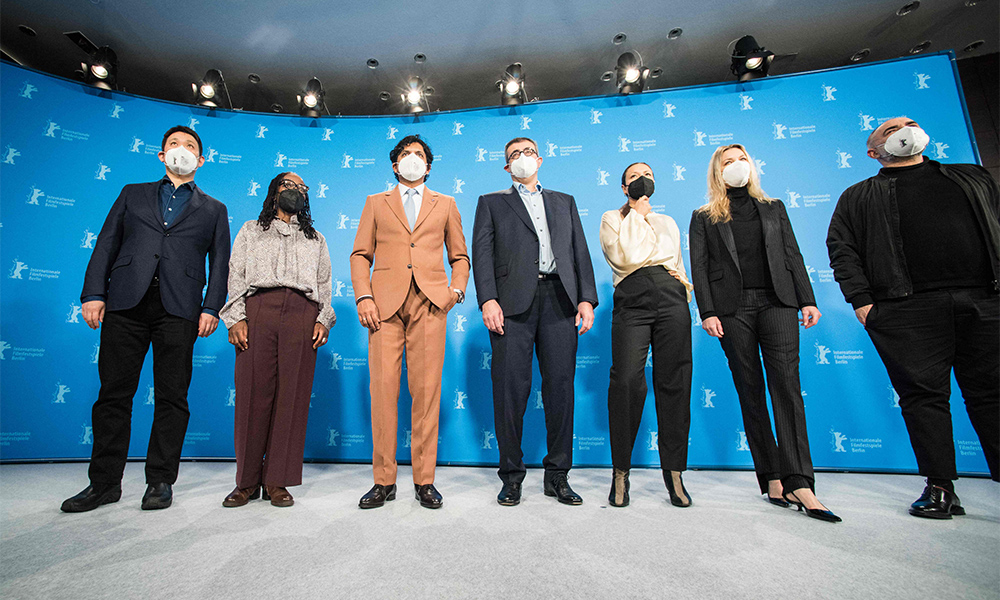The Berlinale, Europe’s first major international film festival of the year, kicked off as a live event yesterday with Germany facing record daily coronavirus infections. Organizers of the event, which started in 1951 as a Cold War culture showcase for the divided German capital, say a raft of precautions will keep audiences safe as they take in the latest movies from around the globe. Artistic director Carlo Chatrian defended the decision against accusations it was irresponsible at this stage of the pandemic, saying the communal movie experience was crucial for the battered industry, as well as for society at large.
“Seeing a film in a theatre, being able to hear breathing, laughter or whispers next to you-even with correct social distancing-contributes in a vital way not only to the viewing pleasure, but also to strengthening the social function that cinema has,” he said. Indian-born American director M Night Shyamalan (“The Sixth Sense”), who is leading the jury, told a press conference yesterday morning he was “just so excited to watch these movies”. “I’m feeling like a kid here and these guys are the perfect partners in crime,” he said.
The jury also includes Japan’s Ryusuke Hamaguchi, whose “Drive My Car” is now nominated for four Oscars, and Tunisian-French producer Said Ben Said, who praised the decision to go ahead with the festival. “Cinema for me has always been like a religion, and as a cinephile I have always been a very religious man... For a religious man, the church is the most important place,” he said.
 French actor Denis Menochet (left), French director Francois Ozon (center) and French actor Khalil Gharbia are given instructions by a steward for their positions to pose for photographers during a photo call for the film ‘Peter von Kant’.
French actor Denis Menochet (left), French director Francois Ozon (center) and French actor Khalil Gharbia are given instructions by a steward for their positions to pose for photographers during a photo call for the film ‘Peter von Kant’.Huppert honors
The Berlinale will open with “Peter von Kant”, a gender-flipped adaptation of Rainer Werner Fassbinder’s classic “The Bitter Tears of Petra von Kant”. The film by acclaimed French director Francois Ozon stars Denis Menochet, Isabelle Adjani and Hanna Schygulla, now 78, who played the cruel young seductress in the original. It is among 18 contenders for the festival’s Golden and Silver Bear top prizes, to be handed out on February 16.
Seven of the filmmakers in competition are women. The festival will also award an honorary Golden Bear for lifetime achievement to French screen legend Isabelle Huppert. Berlin ranks with Cannes and Venice among Europe’s biggest film festivals and prides itself on being most welcoming to the general public, selling thousands of tickets to red-carpet premieres and screenings across the city.
Last year, the Berlinale competition was staged strictly online, just as the first vaccines were rolling out across Europe. This time the event will screen around 250 films, a quarter fewer than in previous years, with limited cinema capacity as well as vaccine, testing and mask requirements and a shorter competition run.
The Berliner Morgenpost warned of a “catastrophe” if the festival turned into a “superspreader event”, while weekly Die Zeit called it “irresponsible” and “backward” not to have an online program. Scott Roxborough, Europe bureau chief for The Hollywood Reporter, also questioned the festival’s choice, saying it arose from deep anxiety about the future of movie-going.
Bounce back?
“People are still very uncertain what the industry will look like after corona,” he told AFP. “Most theatres will have reopened or partially reopened but we still haven’t seen a real bounce back of arthouse movies, of independent movies in the way that a lot of people had hoped.” Big-name filmmakers and stars are awaited in the German capital, with France’s Claire Denis premiering “Both Sides of the Blade” with Juliette Binoche and Vincent Lindon of last year’s Cannes winner, the feminist shocker “Titane”.
“Carol” screenwriter Phyllis Nagy will present her abortion rights drama “Call Jane” starring Elizabeth Banks and Sigourney Weaver. Paolo Taviani, 90, who won the Golden Bear a decade ago with his late brother Vittorio with “Caesar Must Die”, will unveil “Leonora Addio” about the murder of a Sicilian immigrant boy in Brooklyn. And Indonesia’s Kamila Andini will be the first Southeast Asian woman in competition, with “Before, Now and Then” about a war refugee who befriends her husband’s mistress. — AFP











